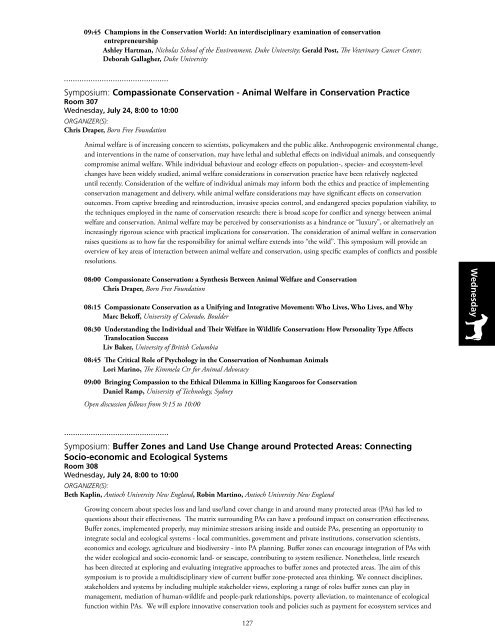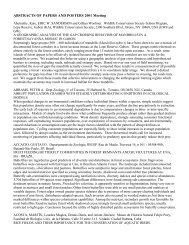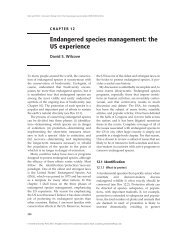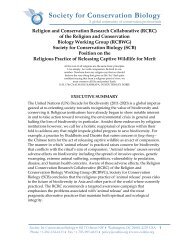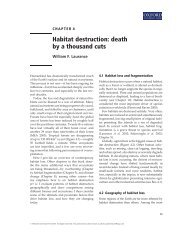ICCB 2013 Program - Society for Conservation Biology
ICCB 2013 Program - Society for Conservation Biology
ICCB 2013 Program - Society for Conservation Biology
You also want an ePaper? Increase the reach of your titles
YUMPU automatically turns print PDFs into web optimized ePapers that Google loves.
09:45 Champions in the <strong>Conservation</strong> World: An interdisciplinary examination of conservation<br />
entrepreneurship<br />
Ashley Hartman, Nicholas School of the Environment, Duke University; Gerald Post, The Veterinary Cancer Center;<br />
Deborah Gallagher, Duke University<br />
...............................................<br />
Symposium: Compassionate <strong>Conservation</strong> - Animal Welfare in <strong>Conservation</strong> Practice<br />
Room 307<br />
Wednesday, July 24, 8:00 to 10:00<br />
Organizer(s):<br />
Chris Draper, Born Free Foundation<br />
Animal welfare is of increasing concern to scientists, policymakers and the public alike. Anthropogenic environmental change,<br />
and interventions in the name of conservation, may have lethal and sublethal effects on individual animals, and consequently<br />
compromise animal welfare. While individual behaviour and ecology effects on population-, species- and ecosystem-level<br />
changes have been widely studied, animal welfare considerations in conservation practice have been relatively neglected<br />
until recently. Consideration of the welfare of individual animals may in<strong>for</strong>m both the ethics and practice of implementing<br />
conservation management and delivery, while animal welfare considerations may have significant effects on conservation<br />
outcomes. From captive breeding and reintroduction, invasive species control, and endangered species population viability, to<br />
the techniques employed in the name of conservation research: there is broad scope <strong>for</strong> conflict and synergy between animal<br />
welfare and conservation. Animal welfare may be perceived by conservationists as a hindrance or “luxury”, or alternatively an<br />
increasingly rigorous science with practical implications <strong>for</strong> conservation. The consideration of animal welfare in conservation<br />
raises questions as to how far the responsibility <strong>for</strong> animal welfare extends into “the wild”. This symposium will provide an<br />
overview of key areas of interaction between animal welfare and conservation, using specific examples of conflicts and possible<br />
resolutions.<br />
08:00 Compassionate <strong>Conservation</strong>: a Synthesis Between Animal Welfare and <strong>Conservation</strong><br />
Chris Draper, Born Free Foundation<br />
08:15 Compassionate <strong>Conservation</strong> as a Unifying and Integrative Movement: Who Lives, Who Lives, and Why<br />
Marc Bekoff, University of Colorado, Boulder<br />
08:30 Understanding the Individual and Their Welfare in Wildlife <strong>Conservation</strong>: How Personality Type Affects<br />
Translocation Success<br />
Liv Baker, University of British Columbia<br />
08:45 The Critical Role of Psychology in the <strong>Conservation</strong> of Nonhuman Animals<br />
Lori Marino, The Kimmela Ctr <strong>for</strong> Animal Advocacy<br />
09:00 Bringing Compassion to the Ethical Dilemma in Killing Kangaroos <strong>for</strong> <strong>Conservation</strong><br />
Daniel Ramp, University of Technology, Sydney<br />
Open discussion follows from 9:15 to 10:00<br />
Wednesday<br />
...............................................<br />
Symposium: Buffer Zones and Land Use Change around Protected Areas: Connecting<br />
Socio-economic and Ecological Systems<br />
Room 308<br />
Wednesday, July 24, 8:00 to 10:00<br />
Organizer(s):<br />
Beth Kaplin, Antioch University New England, Robin Martino, Antioch University New England<br />
Growing concern about species loss and land use/land cover change in and around many protected areas (PAs) has led to<br />
questions about their effectiveness. The matrix surrounding PAs can have a profound impact on conservation effectiveness.<br />
Buffer zones, implemented properly, may minimize stressors arising inside and outside PAs, presenting an opportunity to<br />
integrate social and ecological systems - local communities, government and private institutions, conservation scientists,<br />
economics and ecology, agriculture and biodiversity - into PA planning. Buffer zones can encourage integration of PAs with<br />
the wider ecological and socio-economic land- or seascape, contributing to system resilience. Nonetheless, little research<br />
has been directed at exploring and evaluating integrative approaches to buffer zones and protected areas. The aim of this<br />
symposium is to provide a multidisciplinary view of current buffer zone-protected area thinking. We connect disciplines,<br />
stakeholders and systems by including multiple stakeholder views, exploring a range of roles buffer zones can play in<br />
management, mediation of human-wildlife and people-park relationships, poverty alleviation, to maintenance of ecological<br />
function within PAs. We will explore innovative conservation tools and policies such as payment <strong>for</strong> ecosystem services and<br />
127


